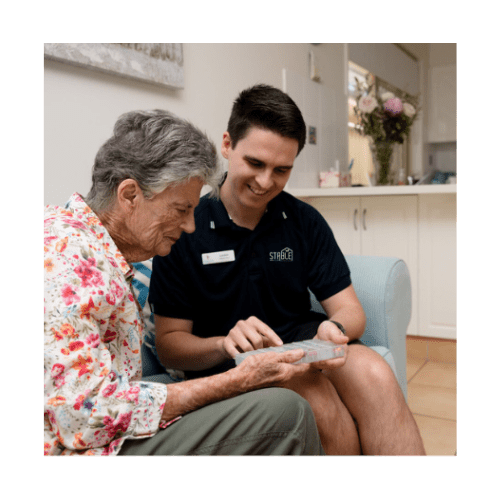The Role of Home Care Providers in Australia in Supporting NDIS Plan Managers and Caregivers
The Role of Home Care Providers in Australia in Supporting NDIS Plan Managers and Caregivers
Blog Article
The Growing Need for In Home Care Givers: Factors Households Pick Specialist Treatment Over Conventional Facilities
The enhancing choice for in-home caretakers over conventional centers is a considerable pattern reshaping the landscape of older treatment. Families are drawn to the benefits of personalized care that straightens with individual demands and preferences, enabling elders to maintain a feeling of freedom in an acquainted environment. This change also highlights the psychological and economic factors to consider that influence decision-making. As we explore the myriad elements adding to this growing demand, the ramifications for both households and caretakers come to be increasingly noticeable. What does this mean for the future of caregiving?
Personalization of Treatment
Customization of treatment in home caregiving is crucial for satisfying the one-of-a-kind needs of each person (home care providers). This method makes sure that treatment plans are customized to the specific needs of the individual, considering their clinical history, individual choices, and lifestyle. By concentrating on the person's unique situations, caregivers can promote a sense of self-respect and freedom, which is often lacking in even more institutionalized setups

Additionally, the capacity to adjust treatment plans as demands develop is essential. Home caregiving enables continual monitoring and alteration of treatment methods, making sure that modifications in wellness status or personal choices are immediately attended to. This versatility not only improves health end results but likewise boosts the lifestyle for individuals obtaining treatment. Inevitably, individualized treatment in home settings dramatically adds to the total wellness of customers, making it a vital component of modern caregiving practices.
Comfort of Home Atmosphere
The comfort of a home environment plays a vital duty in the performance of home caregiving. Several people, particularly senior citizens, experience enhanced tension and anxiousness when put in strange setups such as standard treatment centers.
In addition, the home atmosphere enables a customized approach to caregiving, suiting private choices and regimens. Family members can produce an ambience that reflects their enjoyed one's way of living, guaranteeing that treatment is supplied in such a way that feels all-natural and comfy. This tailored setting motivates better communication and communication between caregivers and clients, cultivating count on and rapport crucial for efficient treatment.
In addition, the comfort of home can help with social connections, as relative and friends can visit more conveniently, giving essential psychological assistance. in home caregivers. Overall, the home environment not just aids to preserve self-respect and freedom however also adds to a better of care, making it a preferred selection for households looking for specialist caregiving solutions

Enhanced Self-reliance for Elders
Home caregiving not just provides convenience however additionally promotes improved freedom for senior citizens. Unlike traditional centers, in-home treatment allows senior citizens to keep their day-to-day regimens and engage in acquainted activities within their very own setting. This autonomy is critical for their emotional wellness and total quality of life.

Moreover, at home caregivers can adapt their services to provide specifically to the one-of-a-kind requirements of each senior, advertising a greater sense of control. This flexibility ensures that seniors can appreciate their pastimes, mingle with family members and friends, and remain energetic in their areas, additionally enhancing their sense of freedom.
Eventually, in-home caregiving not only deals with the physical requirements of seniors however additionally encourages them to lead meeting lives, making it a progressively popular selection for family members looking for the most effective care solutions for their loved ones.
Cost-Effectiveness of In-Home Treatment
In-home care uses a cost-effective alternative to typical nursing centers, allowing households to offer top quality support for their loved ones without incurring expensive costs. The expenses connected with assisted living facility can be overwhelming, usually exceeding $100,000 each year, which can drain monetary resources promptly. In comparison, at home treatment solutions generally bill on a per hour or per-visit basis, allowing family members to tailor care strategies according to their budget plan and certain requirements.
Furthermore, at home care removes additional expenses associated with facility living, such as room, transport and board, and various administrative costs. Households can select to engage caregivers only when essential, possibly lowering general expenses. A substantial benefit of in-home treatment is the ability to keep personal routines, which can add to much better emotional well-being and lower the need for costly clinical interventions arising from abrupt way of living adjustments.
Insurance policy insurance coverage, consisting of long-lasting care insurance, frequently includes at home care solutions, even more enhancing financial click resources availability (ndis plan manager). In general, the cost-effectiveness of in-home care not only reduces the monetary problem on families yet also advertises a more personalized strategy to care that aligns with specific choices and needs
Structure Stronger Family Members Links
Giving care in a familiar environment fosters much deeper family members links, permitting enjoyed ones to proactively join the caregiving procedure. At home treatment develops possibilities for family members to involve meaningfully with their impaired or senior family members, promoting psychological bonds that can be tough to accomplish in institutional settings. The existence of specialist caregivers allows member of the family to concentrate on their relational roles instead than being strained by the physical needs of care.
Additionally, at home treatment allows households to preserve their treasured routines, which can decrease sensations of anxiety and disorientation frequently linked with relocation to care facilities. Shared dishes, familiar surroundings, and the comfort of home provide a sense of stability that enhances wellness and promotes open communication.
Households can collaborate with caregivers to establish tailored care strategies that mirror the individual preferences and needs of their enjoyed ones. This joint method not just encourages the senior but likewise strengthens the family, as members share duties and support each other via tough times. Eventually, in-home treatment cultivates a caring atmosphere where relationships can thrive, enhancing the top quality of life for both recipients and caretakers.
Conclusion
The raising choice for in-home caretakers highlights a significant change in how families come close to senior care. Individualized treatment plans, the comfort of acquainted environments, improved self-reliance for seniors, and cost-effectiveness collectively add to this fad. Furthermore, the participation of relative in the caregiving process promotes stronger links and support networks. As these factors straighten, at home treatment arises as an engaging option to conventional centers, eventually advertising the wellness and lifestyle for seniors.
Families are attracted to the advantages of personalized care that lines up with individual requirements and choices, permitting elders to maintain a sense of autonomy in a familiar atmosphere.At home care offers an affordable alternative to traditional nursing facilities, allowing families to supply quality assistance for their liked ones without sustaining expensive expenditures. In comparison, at home treatment solutions typically bill on a hourly or per-visit basis, enabling family redirected here members to customize care strategies according to their budget plan and particular needs.
At home care produces possibilities for households to explanation engage meaningfully with their impaired or elderly relatives, advertising emotional bonds that can be difficult to attain in institutional settings.The raising choice for in-home caretakers highlights a significant shift in just how family members come close to elderly treatment.
Report this page